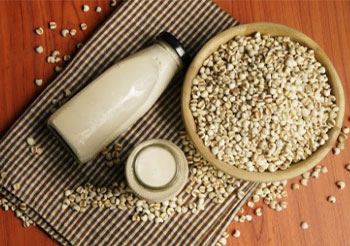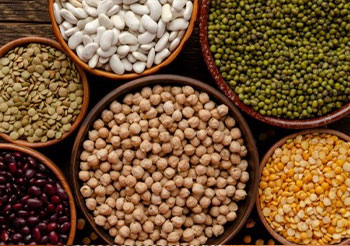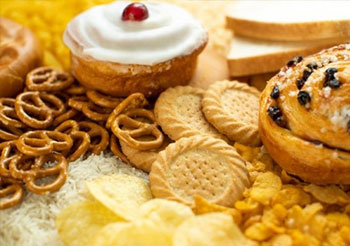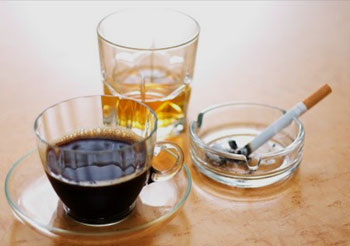

During menopause, your estrogen levels decline and they negatively affect metabolism, leading to weight gain. These changes may also impact your cholesterol levels and may lead to reduced bone density, thus increasing your risk of fractures. You may also experience uncomfortable symptoms like hot flushes and poor sleep. However, making changes in your diet may help relieve a few symptoms of menopause.
You may wonder what foods to eat and what to avoid to reduce your menopause symptoms. Eating certain foods may help relieve the symptoms of menopause like hot flushes, poor sleep, and low bone density.

Calcium-rich foods
Calcium is essential for optimal bone health throughout your life. Since calcium is not produced by your body, it is important to consume enough amount of it so that your body does not utilize it from the bones to fulfill its needs. During menopause, a decrease in the level of estrogen can increase your risk of fractures. Calcium can be found in dairy products like milk, yoghurt, and cheese. Plant sources, such as broccoli, Brussels sprouts, and green beans; and leafy vegetables like kale, collard greens, and turnip greens also contain calcium. Including dairy products in your diet may also improve your sleep.

Whole grains
Whole grains are an important part of menopause diet as they are rich in nutrients, including fiber and vitamin B. They are good sources of slow-release carbohydrates. Slow-release carbohydrates may help you stay fuller for a long time, helping you avoid menopause weight gain. A diet rich in whole grains has shown to reduce your risk of heart disease, a major concern of menopause as low estrogen levels compromise your heart health. It has also been linked to reducing your risks of cancer and premature death. Whole grains that you can include in your diet are brown rice, whole-wheat brea.d, barley, quinoa, Khorasan wheat, and rye. Though not cultivated in India, products may available

Fruits and vegetables
Fruits and vegetables are full of vitamins, minerals, fiber and antioxidants. A diet rich in fruits and vegetables can help you prevent certain menopause symptoms. Fruits & vegetables are low in calories and can make you feel full, thus helping you maintain your weight and avoid weight loss. Your risk of heart disease increases after menopause. This could be due to increasing age, weight gain, or low levels of estrogen. Having fruits and vegetables may prevent heart disease and bone loss. A study suggests that eating fruits and vegetables reduces hot flushes.

Phytoestrogen-containing foods
Phytoestrogens are naturally occurring plant compounds that act as weak estrogens in your body. Thus, they may help to balance hormone levels in your body. Foods rich in natural phytoestrogens include soybeans, chickpeas, peanuts, flax seeds, barley, grapes, berries, plums, and green & black tea. Evidence suggests that natural sources of phytoestrogens are better than supplements or processed foods.

Beans and legumes
During the menopause transition, beans and legumes are some of the most important plant-based sources of protein that are encouraged over animal-based sources of proteins. Research studies indicate that consuming a majority of plant-based diet may reduce the occurrence of hot flushes. Lentils, chickpeas, green peas, kidney beans, and black beans are some of the best choices for a perimenopause diet.
Avoiding certain foods may reduce some symptoms of menopause.
These include:

Added sugars and processed carbs
During menopause, high blood sugar, the inability of cells to respond to insulin, and certain disorders may increase your chances of hot flushes. Processed foods & added sugars increase your blood sugar rapidly. Reducing your intake of added sugars and processed foods like white bread, crackers and baked items may help reduce hot flashes. Cutting down on sweets may decrease your calorie count, thus helping you avoid weight gain.

Alcohol and caffeine
You may have trouble sleeping and experience hot flushes while in menopause. Caffeine and alcohol can trigger hot flushes increasing their severity. They are also known to disrupt sleep. Thus, you should avoid having caffeine and alcohol, especially near bedtime.

Spicy foods
When you are going through menopause, avoiding spicy foods is a common recommendation. Spicy foods can worsen your hot flushes. You can still include small proportions in your diet; however, avoid them if they worsen your symptoms.

High-salt foods
High salt intake may lower your bone density. After menopause, a decrease in estrogen increases your risk of developing high blood pressure. Thus, reducing your sodium intake may help lower the risk and also improve your overall mood.
Lifestyle changes including a healthy diet and regular exercise may help prevent your menopause symptoms and reduce them.


